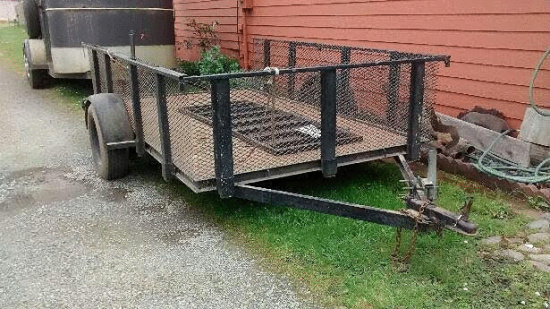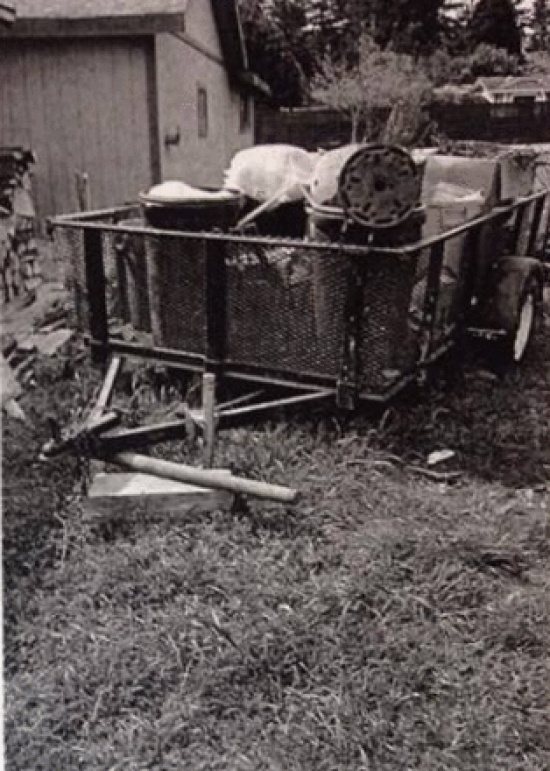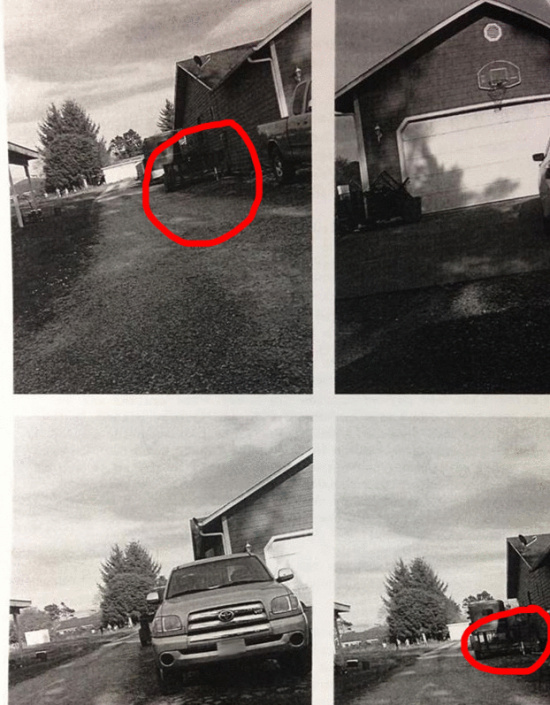A photo of the trailer at Ortega’s home following the bust. Photo taken by Private Investigator Kevin Stonebarger.
###
PREVIOUSLY
- METH, LIES AND VIDEOTAPE: How Hidden Cameras and Crooked Policing Botched One of the Biggest Busts in Del Norte History
- METH, LIES AND VIDEOTAPE: The Footage That Launched an FBI Investigation and Fractured a Local Law Enforcement Community
###
Part three of a series
When a police agency seizes property from a suspected drug dealer, state law requires officers to give the suspect adequate notice of what was taken and ensure the suspect has the opportunity to reclaim their property through due process.
James Banuelos’ adequate notice came several days after his arrest, when he happened upon his missing trailer being towed down the street by Sheriff’s Deputy Enrique Ortega.
Although the trailer was eventually determined to legally belong to the local deputy, the trailer’s backstory and the means by which Ortega reclaimed the trailer raise serious questions about the DNSO’s asset forfeiture procedures.
Del Norte District Attorney Dale Trigg told the Outpost that improperly processed evidence is a recurring problem at the DNSO.
“They’re very sloppy in the way they do things,” Trigg said. “There was unquestionably a problem with the processing of evidence in this case.”
The problem with the trailer: It wasn’t processed at all.
According to an FBI Report, DNSO Sergeant Richard Griffin “admitted that no paperwork was done regarding the seizure and return of the trailer to Ortega until Griffin was contacted by the FBI.
DNSO Commander Bill Steven told the Outpost that the trailer was stored on county property until it was determined that Ortega was the rightful owner.
“We didn’t just haul it from the search warrant to [Ortega’s] house,” Steven said. “We sat on it for a couple of weeks before ownership to determined.”
However, Private Investigator and retired Arcata Police Officer Kevin Stonebarger said the trailer should have been included in the property receipt officers gave to Banuelos on the day of his arrest.
“There are a ton of documents that need to be completed. If you were taking something from someone it has to appear on the property receipt, and if you believe it’s stolen, you have to fill out a CHP 180 form or its equivalent,” Stonebarger said. “The DNSO didn’t prepare a supplemental report for 7 weeks, that is absolutely unacceptable by any police standards.”
In addition to the lack of paperwork, the FBI’s investigation also tells the story of a broken-down trailer that was improperly disposed of, and then reclaimed by Ortega years after the trailer was restored by Banuelos.
According to court and FBI documents, Ortega had the vehicle taken to a local tow yard four years ago to repair a broken axle. After receiving a repair quote, Ortega let the trailer sit at the tow yard for a year.
Ortega was then told second-hand by a relative that the tow yard owner planned to junk the trailer if he did not pick it up soon. Nothing was done, and the trailer was sold.
This practice is known as a lien sale, and is a common way for auto-repair businesses to make up for unpaid services. A legal lien sale must be authorized by the DMV. However, in true Del Norte fashion, the tow yard never bothered to file the proper paperwork.
Ortega was eventually informed that the trailer had been junked by a local auto-wrecking company. According to FBI reports, he considered taking legal action, but ultimately considered the trailer a loss.
A year later, Banuelos came across the trailer while performing yard work for a man in Klamath, Calif. He bought the trailer for $50, in addition to the yard work. Banuelos then customized the trailer by installing a new floor, adding side walls, and giving it a fresh coat of paint. But for whatever reason, Banuelos never bothered to register the trailer with the DMV.
Fast forward to March of 2015, and Del Norte Sheriff’s deputies are running plates on Banuelos’ property. Lo and behold, the trailer that passed through at least three sets of hands between Banuelos and Ortega, still traced back to the only person who ever bothered to fill out a registration form … Deputy Ortega.
Ortega was called to the scene of the raid to identify the trailer. The deputy then did something he never bothered to do in three years. He reported the vehicle stolen. Depending on who you ask, Ortega either took possession of the vehicle within a few days or a couple of weeks after the bust. Either way, no proper police paperwork was filed until the FBI started asking questions.
In a small town where no one bothers to file the proper paperwork, ownership battles can be reduced to a case of Keepers v. Weepers. But when cops play by the same rules, it poses serious consequences for local prosecutors like District Attorney Trigg, who told the Outpost that the missing paperwork undoubtedly contributed to his decision to settle the Banuelos case.
“The murkier a case gets for a prosecutor, the harder it is to get a conviction. If I have to deal with that going in, there’s reasonable doubt right from the chute,” Trigg said. “If I had a clean case without a cop stealing money or improperly logged evidence, I would be in a different position.”
A photo of the trailer at Ortega’s home, taken by FBI investigators during a stakeout.



CLICK TO MANAGE